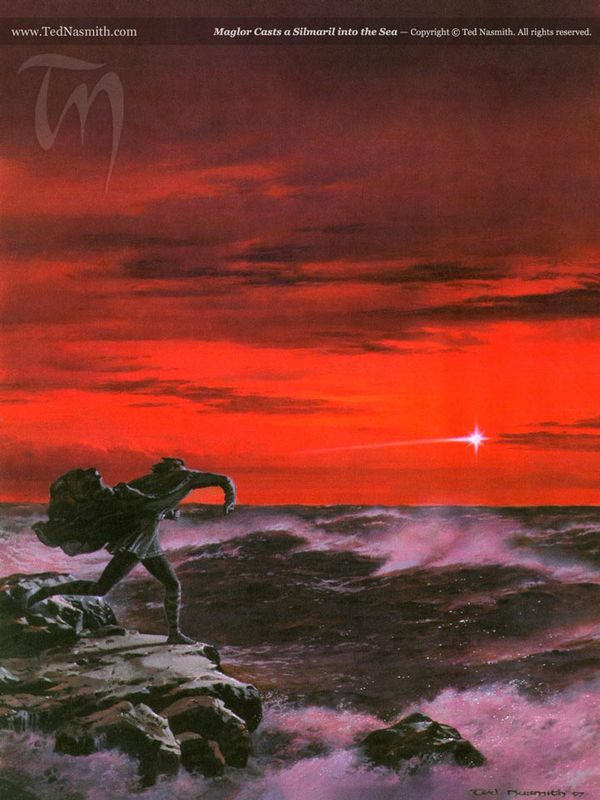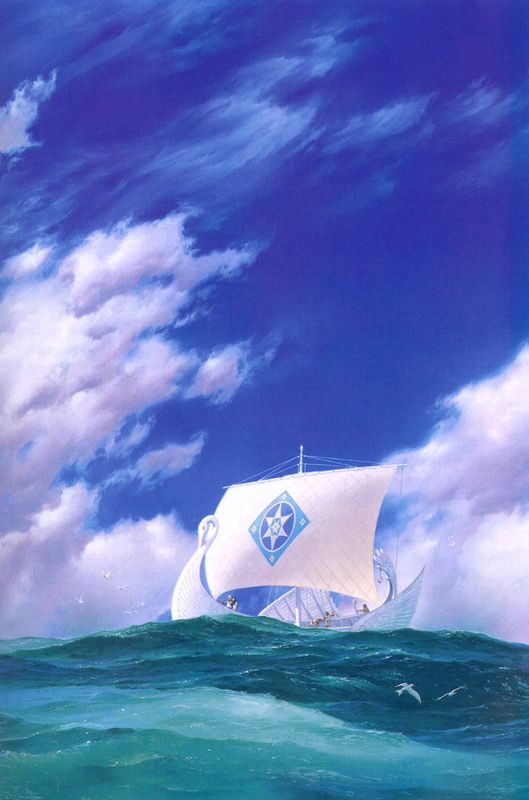And when they came into the West the Elves of Beleriand dwelt upon Tol Eressëa, the Lonely Isle, that looks both west and east; whence they might come even to Valinor. They were admitted again to the love of Manwë and the pardon of the Valar; and the Teleri forgave their ancient grief, and the curse was laid to rest.

Yet not all the Eldalië were willing to forsake the Hither Lands where they had long suffered and long dwelt; and some lingered many an age in Middle-earth. Among those were Círdan the Shipwright, and Celeborn of Doriath, with Galadriel his wife, who alone remained of those who led the Noldor to exile in Beleriand. In Middle-earth dwelt also Gil-galad the High King, and with him was Elrond Half-elven, who chose, as was granted to him, to be numbered among the Eldar; but Elros his brother chose to abide with Men. And from these brethren alone has come among Men the blood of the Firstborn and a strain of the spirits divine that were before Arda; for they were the sons of Elwing, Dior's daughter, Lúthien's son, child of Thingol and Melian; and Eärendil their father was the son of Idril Celebrindal, Turgon's daughter of Gondolin.
But Morgoth himself the Valar thrust through the Door of Night beyond the Walls of the World, into the Timeless Void; and a guard is set for ever on those walls, and Eärendil keeps watch upon the ramparts of the sky. Yet the lies that Melkor, the mighty and accursed, Morgoth Bauglir, the Power of Terror and of Hate, sowed in the hearts of Elves and Men are a seed that does not die and cannot be destroyed; and ever and anon it sprouts anew, and will bear dark fruit even unto the latest days.
Here ends the SILMARILLION. If it has passed from the high and the beautiful to darkness and ruin, that was of old the fate of Arda Marred; and if any change shall come and the Marring be amended, Manwë and Varda may know; but they have not revealed it, and it is not declared in the dooms of Mandos.
AKALLABÊTH
The Downfall of Númenor

It is said by the Eldar that Men came into the world in the time of the Shadow of Morgoth, and they fell swiftly under his dominion; for he sent his emissaries among them, and they listened to his evil and cunning words, and they worshipped the Darkness and yet feared it. But there were some that turned from evil and left the lands of their kindred, and wandered ever westward; for they had heard a rumour that in the West there was a light which the Shadow could not dim. The servants of Morgoth pursued them with hatred, and their ways were long and hard; yet they came at last to the lands that look upon the Sea, and they entered Beleriand in the days of the War of the Jewels. The Edain these were named in the Sindarin tongue; and they became friends and allies of the Eldar, and did deeds of great valour in the war against Morgoth.
Of them was sprung, upon the side of his fathers, Bright Eärendil; and in the Lay of Eärendil it is told how at the last, when the victory of Morgoth was almost complete, he built his ship Vingilot, that Men called Rothinzil, and voyaged upon the unsailed seas, seeking ever for Valinor; for he desired to speak before the Powers on behalf of the Two Kindreds, that the Valar might have pity on them and send them help in their uttermost need. Therefore by Elves and Men he is called Eärendil the Blessed, for he achieved his quest after long labours and many perils, and from Valinor there came the host of the Lords of the West. But Eärendil came never back to the lands that he had loved.
In the Great Battle when at last Morgoth was overthrown and Thangorodrim was broken, the Edain alone of the kindreds of Men fought for the Valar, whereas many others fought for Morgoth. And after the victory of the Lords of the West those of the evil Men who were not destroyed fled back into the east, where many of their race were still wandering in the unharvested lands, wild and lawless, refusing alike the summons of the Valar and of Morgoth. And the evil Men came among them, and cast over them a shadow of fear, and they took them for kings. Then the Valar forsook for a time the Men of Middle-earth who had refused their summons and had taken the friends of Morgoth to be their masters; and Men dwelt in darkness and were troubled by many evil things that Morgoth had devised in the days of his dominion: demons, and dragons, and misshapen beasts, and the unclean Orcs that are mockeries of the Children of Ilúvatar. And the lot of Men was unhappy.
But Manwë put forth Morgoth and shut him beyond the World in the Void that is without; and he cannot himself return again into the World, present and visible, while the Lords of the West are still enthroned. Yet the seeds that he had planted still grew and sprouted, bearing evil fruit, if any would tend them. For his will remained and guided his servants, moving them ever to thwart the will of the Valar and to destroy those that obeyed them. This the Lords of the West knew full well. When therefore Morgoth had been thrust forth, they held council concerning the ages that should come after. The Eldar they summoned to return into the West, and those that hearkened to the summons dwelt in the Isle of Eressëa; and there is in that land a haven that is named Avallónë, for it is of all cities the nearest to Valinor, and the tower of Avallónë is the first sight that the mariner beholds when at last he draws nigh to the Undying Lands over the leagues of the Sea. To the Fathers of Men of the three faithful houses rich reward also was given. Eönwë came among them and taught them; and they were given wisdom and power and life more enduring than any others of mortal race have possessed. A land was made for the Edain to dwell in, neither part of Middle-earth nor of Valinor, for it was sundered from either by a wide sea; yet it was nearer to Valinor. It was raised by Ossë out of the depths of the Great Water, and it was established by Aulë and enriched by Yavanna; and the Eldar brought thither flowers and fountains out of Tol Eressëa. That land the Valar called Andor, the Land of Gift; and the Star of Eärendil shone bright in the West as a token that all was made ready, and as a guide over the sea; and Men marvelled to see that silver flame in the paths of the Sun.
Then the Edain set sail upon the deep waters, following the Star; and the Valar laid a peace upon the sea for many days, and sent sunlight and a sailing wind, so that the waters glittered before the eyes of the Edain like rippling glass, and the foam flew like snow before the stems of their ships. But so bright was Rothinzil that even at morning Men could see it glimmering in the West, and in the cloudless night it shone alone, for no other star could stand beside it. And setting their course towards it the Edain came at last over leagues of sea and saw afar the land that was prepared for them, Andor, the Land of Gift, shimmering in a golden haze. Then they went up out of the sea and found a country fair and fruitful, and they were glad. And they called that land Elenna, which is Starwards; but also Anadûnë, which is Westernesse, Númenórë in the High Eldarin tongue.
This was the beginning of that people that in the Grey-elven speech are called the Dúnedain: the Númenóreans, Kings among Men. But they did not thus escape from the doom of death that Ilúvatar had set upon all Mankind, and they were mortal still, though their years were long, and they knew no sickness, ere the shadow fell upon them. Therefore they grew wise and glorious, and in all things more like to the Firstborn than any other of the kindreds of Men; and they were tall, taller than the tallest of the sons of Middle-earth; and the light of their eyes was like the bright stars. But their numbers increased only slowly in the land, for though daughters and sons were born to them, fairer than their fathers, yet their children were few.